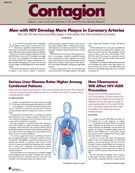Publication
Article
Contagion
Hemophiliac Patients with HIV Show Increased Amount of Immune Cells Targeting HIV
Author(s):
Study results suggest that patients with long-term HIV who also have hemophilia may have an increased proportion of immune cells in their blood that target HIV.

A research team from the University of Heidelberg and Kurpfalz Hospital in Germany has concluded that people who have been infected with HIV for decades and also have hemophilia have an increased amount of immune cells in their blood that specifically target HIV. This protective immune response helps chronically infected hemophilia patients survive even throughout periods of HIV activity.
Volker Daniel and colleagues compared the levels of CD8+ lymphocytes, a class of HIV-reactive immune cells, in the blood of hemophilia patients infected with HIV for 30 years and in healthy male adults. Forty-eight patients were HIV+ hemophilia patients. Lymphocyte subsets were studied in 102 healthy controls. Plasma cytokines were examined in 39 healthy individuals. Immune complex—loaded CD4+ lymphocytes were studied in 19, and CD8+ lymphocytes reactive with HIV- and CMV-specific pentamers were examined in 25.
Patient mean age was 46±8 years and that of healthy controls 40±13 years. All of the patients were men infected with HIV at the end of the 1970s and early 1980s via virus-contaminated clotting factor products.
The scientists concluded that patients with hemophilia and HIV showed a broad polyclonal CD8+ T cell response against HIV. “The cellular antiretroviral immune response appeared to be strongest and polyclonal during periods of HIV-1 replication and remained detectable in many patients during periods of HIV-1 quiescence,” write the authors of the study. “The consistent cellular anti-HIV-1 response in combination with HAART is believed to ensure stability and survival of chronically HIV-1—infected hemophilia patients. HAART might only be efficient in patients with an immune system that is partially functional, similar to antibiotics that are ineffective in patients with severe combined immunodeficiency disease.”
“Understanding the reasons for long-term clinical stability in hemophilia patients who are living with HIV remains an important research goal, with high clinical significance,” BioResearch Open Access Editor Jane Taylor, PhD, MRC Centre for Regenerative Medicine, University of Edinburgh, Scotland, said in a statement.




